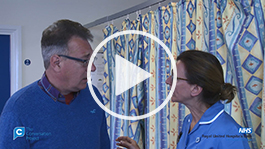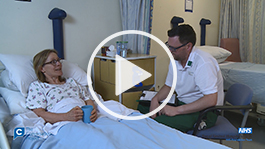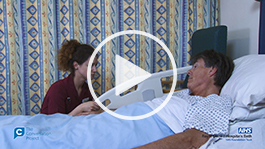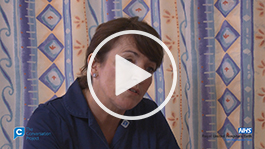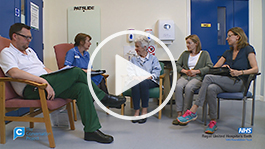Palliative Care |
C3
|
Films
Conversation Project Films
Introduction
These films are for healthcare professionals to support learning and reflection.
These short films have been developed to support the conversations healthcare professionals may have with patients, families and carers when facing an uncertain future or approaching the end of their lives.
Patients, families and carers often appreciate opportunities for honest, open conversations and to be listened to about what matters to them most. The need for compassionate conversations can arise when people are feeling worried, vulnerable or facing decisions about their future treatment and care.
It is important that we give patients the opportunity to talk about what is important and what matters most to them, when recognising that they are living with uncertainty or nearing end of life. Some patients may limit the information they wish to receive, others may need support to think about and focus on what is most important to them.
Some healthcare professionals may shy away from these conversations, for fear of not having the right skills or answers to questions. Some may worry about causing distress or where the conversation might lead to. Pressures of time and work can also prevent conversations from being started. However, conversations of great importance to patients and families can take place in relatively short periods of time, with different members of the MDT, and the films help show this.
About the films
These films have been made by the Palliative Care Team at the Royal United Hospitals Bath NHS Foundation Trust (RUH), to support communication skills used in 'normal' end of life and planning ahead conversations.
The scripted dialogues in the films are not perfect examples of conversations, but have been developed to prompt thought and create discussion about what we might consider to be useful and important. These films depict both hospital and community settings and include skills, phrases and manner that are applicable in any care setting.
The parts are played by volunteer actors and healthcare professionals and the Palliative care team are grateful to everyone involved that enabled these films to be made. This includes The Health Foundation and Bath and North East Somerset CCG for their funding support. We hope you find them helpful and use them as part of individual learning or group discussion.
If you watch a film or series of films, please complete this short evaluation – thank you.
Conversation Project Films - Evaluation
The Conversation Project ACP films
Each film has an introduction and reflective questions at the end to support learning. The films can be paused if required to support group work with the reflective questions.
The films are not in sequence and can each be viewed as stand-alone scenarios.
If you watch a film or series of films, please complete this short evaluation - thank you.

